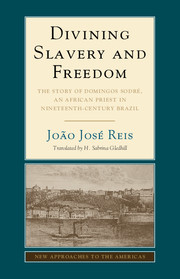 Divining Slavery and Freedom
Divining Slavery and Freedom Book contents
- Frontmatter
- Dedication
- Contents
- Preface
- Abbreviations
- Map
- 1 Cops and Candomblé in Domingos Sodré's Day
- 2 From an African in Onim to a Slave in Bahia
- 3 Domingos Sodré, Diviner
- 4 Witchcraft and Slavery
- 5 Witchcraft and Manumission
- 6 Meet Some Friends of Domingos Sodré
- 7 Domingos Sodré, Ladino Man of Means
- Epilogue
- Timeline of Domingos Sodré's Life
- Glossary
- Appendix 1 Domingos Sodré's Last Will and Testament (1882)
- Appendix 2 Domingos' Manumission and Manumissions Granted by Him
- Appendix 3 Delfina's Petition Guaranteeing Her Mental Health
- Illustration and Map Credits
- Bibliography
- Acknowledgments
- Name Index
- Subject Index
2 - From an African in Onim to a Slave in Bahia
Published online by Cambridge University Press: 05 May 2015
- Frontmatter
- Dedication
- Contents
- Preface
- Abbreviations
- Map
- 1 Cops and Candomblé in Domingos Sodré's Day
- 2 From an African in Onim to a Slave in Bahia
- 3 Domingos Sodré, Diviner
- 4 Witchcraft and Slavery
- 5 Witchcraft and Manumission
- 6 Meet Some Friends of Domingos Sodré
- 7 Domingos Sodré, Ladino Man of Means
- Epilogue
- Timeline of Domingos Sodré's Life
- Glossary
- Appendix 1 Domingos Sodré's Last Will and Testament (1882)
- Appendix 2 Domingos' Manumission and Manumissions Granted by Him
- Appendix 3 Delfina's Petition Guaranteeing Her Mental Health
- Illustration and Map Credits
- Bibliography
- Acknowledgments
- Name Index
- Subject Index
Summary
DOMINGOS' AFRICAN BACKGROUND
We know very little about Domingos' African background. Once he was in Bahia, he was identifi ed as a Nagô, one of the many African “nations” or ethnic terms that, in this case, designated the Yoruba-speaking people. In 1882, Domingos stated in his last will and testament that he was born in the Yoruba kingdom of Onim, and I estimate his birth to be in the late eighteenth century. He also declared that he was the “legitimate child” of African parents, Porfírio Araújo de Argolo and “Bárbara de tal,” or “surname unknown.”
I can think of two possible narratives for this African family's enslavement. One is that Domingos and his parents were sold and shipped to Bahia together, because he mentioned Christian names for both of them as well as his father's Brazilian surname, neither of which sufficed to find them in the local archives. Their names also indicate that both parents managed to achieve manumission, because slaves rarely carried surnames. They also suggest that each member of the family belonged o a different master, at least at the time when they were freed. The son's surname was Sodré, the father's was Araújo de Argolo, an aristocratic family name in Bahia, and the mother's was unknown: by the time he dictated his will in his old age, Domingos could no longer remember it.
Another, less likely, possibility is that Domingos' parents were freed-persons who had returned to Africa from Bahia, and that is why he referred to them by their Christian names, which returnees usually retained. Most of the former slaves known to have embarked on that return journey did so at a later time, particularly after the Revolt of the Malês in 1835, when many were deported from Brazil and others decided to leave Brazil after relentless government harassment.
- Type
- Chapter
- Information
- Divining Slavery and FreedomThe Story of Domingos Sodré, an African Priest in Nineteenth-Century Brazil, pp. 32 - 74Publisher: Cambridge University PressPrint publication year: 2015
